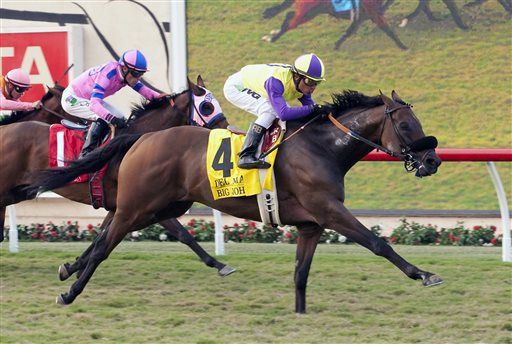PHOENIX — Owners of the state’s largest race track are weighing whether to sue to block a new law about who is entitled to get televised signals for out-of-state races.
Vince Francia, general manager of Turf Paradise in Phoenix, told Capitol Media Services the law signed last week by Gov. Doug Ducey endangers its ability to continue to get signals from several tracks.
That’s because the company that provides the signals, Monarch Content Management, has said it will withdraw from the Arizona market if it must comply with the new state law requiring it to also share those signals with off-track betting sites operated by Arizona Downs.
Francia said such a move would have a major impact on Turf’s revenues, because 44 percent of its revenues come from those who wager on the races provided to Turf by Monarch and from revenues from other Monarch sites where people bet on live races from Turf. That translates to close to $4 million a year.
“It’s something we would not be able to survive,” he said.
But Ann McGovern, general manager of the newly opened Arizona Downs in Prescott Valley, said all she wants is fairness.
What’s behind the spat is a last-minute provision added by Sen. Sonny Borrelli, R-Lake Havasu City, to an unrelated measure dealing with horse racing at Tucson’s Rillito Race Track.
The additional language spells out that any simulcast of live racing brought into Arizona from another state “must be offered to each commercial live-racing permittee in this state and additional wagering facility in the state.”
If Monarch wants to continue providing signals to Turf Paradise, it also has to serve Arizona Downs and its OTB facilities, including facilities in the Phoenix area, and at the same rate.
Sen. J.D. Mesnard, R-Chandler, opposed the change, saying the state should not dictate contract terms. But the Senate approved it and Ducey signed it into law.
It is set to take effect Aug. 27. In the interim, Francia said Turf is examining its legal options, saying there are doubts about the law’s constitutionality.
Monarch President Scott Daruty also is consulting with attorneys about challenging the act.
One issue, said Daruty, is the 1978 federal Interstate Horseracing Act, which is designed to ensure that states do not use their own laws to interfere with interstate off-track wagering. Then there is the Commerce Clause of the U.S. Constitution, which has its own limits on the ability of states to interfere in matters of interstate commerce.
McGovern, of Arizona Downs, said all the new state law does is ensure that brokers like Monarch provide equal access and equal treatment to anyone who wants to buy the signal.
And Tom Auther, a co-owner of Arizona Downs, said there’s nothing illegal about the new law, and that there are similar statutes in other states.
The real danger, he said, would be to allow Monarch — or any signal provider — to cut deals with one track for exclusive access to OTB signals that would put every other track in the state out of business.
Daruty said it’s not that simple, as Monarch has had a relationship with Turf for decades, long before Arizona Downs reopened for OTB last year and began live racing last month.





